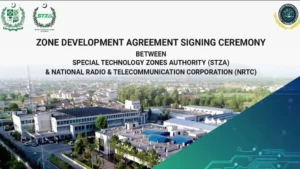In the domain of modern information distribution, journalists, activists, and social media stars hold extraordinary influence. Their capacity to form narratives, sway public opinion, and inspire action is both a luxury and a duty. However, this influence has the potential for misuse, as seen by the prevalence of false reporting and misleading activities in our media environment. Recent developments in Pakistan, notably the foiled terrorist attack on the Gwadar Development Authority Complex, show the consequences of misleading reporting, which not only distorts reality but also escalates tensions and undermines security operations.
Distortion of Truth: Unraveling Deceptive Narratives
Following a recent militant attack on the Gwadar Development Authority Complex, security forces responded quickly, thwarting the BLA Majeed Brigade’s evil aims and killing all eight terrorists. However, as the dust settles, a disconcerting fact emerges from the aftermath: the identities of the murdered militants, many of whom were on the Baloch missing people list, call into doubt the narratives surrounding Balochistan’s sociopolitical situation. This is not a unique instance; it parallels the events of the Mach attack barely a month ago when a similar finding was discovered – a missing individual among the murdered terrorists. Such instances revealed a deeper, more frightening truth.
The topic of the Baloch missing individuals, which is frequently depicted as a humanitarian disaster, appears to be a well-staged political spectacle. It is used to generate popular sympathy and gain foreign financing, hence maintaining Balochistan’s separatist efforts. They capitalize on Baloch’s concerns to increase ratings and relevancy, with little genuine compassion for the Balochi people or their cause. The lack of these loud champions at times of disaster, like as the recent floods in Balochistan, contrasts sharply with institutions such as the Pakistan Army’s persistent support.
Exploiting Tragedy for Personal Gain
One of the most heinous forms of false reporting is the use of terrible events, such as terrorist attacks, for political benefit. Following the Gwadar Port incident, several factions attempted to belittle the security forces’ valour while spreading false information about the assailants’ identities. Claims that the murdered terrorists were “missing persons” and allegations of official culpability in their deaths are thinly veiled attempts to delegitimize the administration and instigate public discontent.
Perhaps the most alarming aspect is the negative impact of inaccurate reporting on national security and diplomatic relations. The attack on Gwadar Port, apparently carried out by extremists wanting to destabilize the area, poses enormous problems not just to Pakistan’s internal security but also to its strategic partnerships, notably with China. False narratives about the incident not only weaken trust in the government’s capacity to maintain law and order, but also imperil important economic initiatives like the China-Pakistan Economic Corridor (CPEC).
Also Read: Unmasking Disinformation: India’s Enduring Propaganda Against Pakistan
The Imperative of Truth and Accountability
In light of these revelations, concerted efforts must be made to combat false reporting and hold accountable those who seek to manipulate public discourse for personal or political gain. Journalists must adhere to the highest standards of journalistic integrity, verifying facts and sources rigorously before disseminating information. Activists and social media personalities likewise have a responsibility to uphold truth and transparency, refraining from the spread of misinformation and inflammatory rhetoric. On the other hand, State institutions have long argued that the narrative around Baloch missing persons is deceptive. They claim that many of these people are not victims, but militants hidden in the mountains and caves, utilized by separatist forces as pawns in a broader geopolitical game. The task today is to expose these differences and create a better awareness of the complicated realities at play.
Despite the chaos, one message remains clear: support with Balochistan and its people. The welfare of Balochis is inextricably linked to the stability and prosperity of the state. It is necessary to discern between genuine advocacy for Baloch rights and the self-serving intentions of opportunistic individuals. Pakistan Army’s steadfast support for the people of Balochistan. In the face of constant difficulties and threats to national security, the Pakistan Army remains strong in its commitment to Balochistan’s sovereignty and development, as well as the resilience of its people. With extraordinary heroism and steadfast determination, the brave soldiers of the Pakistan Army have repeatedly proved their commitment to maintaining peace, stability, and growth in the area.

Conclusion
To summarize, the predominance of false reporting in journalism, activism, and social media is a danger to truth, integrity, and communal peace. The recent events surrounding the attempted terrorist attack on Pakistan’s Gwadar Development Authority Complex serve as a harsh reminder of the hazards that come with false narratives. While security forces effectively eliminated the danger, the subsequent identification of the terrorists’ identities, including people classified as missing, raises serious concerns about the veracity of popular narratives about Balochistan’s geopolitical situation.
The exploitation of sad occurrences for political benefit, as well as the spread of misleading information, erodes public confidence while also jeopardizing national security and diplomatic ties. The pernicious nature of misleading reporting goes beyond simple disinformation; it can escalate tensions, stir discontent, and stymie progress on vital economic ventures like the CPEC. It is critical that all stakeholders, including journalists, activists, and social media influencers, maintain the greatest levels of honesty and accountability in their reporting and advocacy work.
Furthermore, despite the uncertainty and disarray, it is critical to reaffirm solidarity with the people of Balochistan. Their well-being and prosperity are inextricably related to the stability and success of the country as a whole. The Pakistan Army’s consistent commitment to Balochistan’s sovereignty and development initiatives demonstrates the necessity of unity and collaboration in solving the region’s difficulties. As we traverse the intricacies of contemporary information distribution, let us be mindful of the hazards of false reporting and defend the ideals of truth, openness, and empathy in our goal of a fairer and equal society.
Long Live Balochistan, Long Live Pakistan!
The opinions shared in this article reflect the author’s personal views and do not necessarily align with the institution’s official stance.




